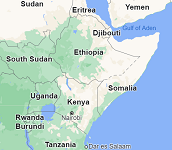People in East Africa mainli in Ethiopia, Kenya and Uganda face ongoing health risks because tensions within the policy-making process have slowed the introduction of action that could significantly reduce air pollution, a new study reveals.
Air pollution is the leading global environmental cause of premature death and has become a ‘wicked’, or apparently intractable, problem – particularly in the capital cities of Ethiopia, Uganda and Kenya. Lack of effective agreement and action between scientists, non-governmental organisations (NGOs), and politicians has meant that an effective air quality policy is yet to emerge in East Africa – specifically in Addis Ababa, Kampala and Nairobi.
Publishing their findings in Environment and Planning C: Politics and Space, experts from the University of Birmingham and University College London reveal a framework of three institutional ways of thinking or ‘logics’ that can act as barriers to creating effective policy solutions:
• ‘science’ – the means by which societal problems such as air pollution become visible;
• ‘influencer’ – NGOs and other stakeholders, such as citizens, fostering awareness and supporting or funding actions to increase visbility; and
• ‘political’ – the decision makers who have the power to prioritise policy and ensure policy-led solutions are delivered.
They also identify four ‘contexts’ in which these ‘logics’ interact: policy creation: influence, policy formation, implementation and outcomes.
Co-author Professor John Bryson, Chair in Enterprise and Economic Geography at the University of Birmingham, commented: “Our study reveals why politicians don’t act to address known societal problems. There is a tension between science, NGOs and politicians and the outcome is that too often a known problem that is life-limiting is relegated within the political process.
“This process may result in policy being developed, but never approved, or policy is approved but never implemented. Universities play an important role in highlighting such societal problems and science is then translated by NGOs in an attempt to encourage a political reaction which never comes or is too weak to make a real difference.”
Rapid urbanisation in the three East African capital cities has contributed to worsening air quality problems with traffic (exhaust and non-exhaust emissions), industry, and solid waste burning as the primary air pollution sources in these cities.
The emergence of air pollution policy in East Africa was initially based on science identifying, defining, and measuring its impact. NGOs then tried to enhance the local visibility of a ‘wicked’ problem, but conflicting political priorities slowed progress on developing effective local and transnational air quality policies.
“The problem rests on a failure to align air pollution as a ‘wicked’ problem compared to other societal challenges which have been prioritised in the political process resulting in investment,” explained Professor Bryson. “In these three East African cities, the fact that effective and enforced policy solutions to air quality are yet to be developed reflects a failure to prioritise air pollution compared to more pressing political policy challenges.”

